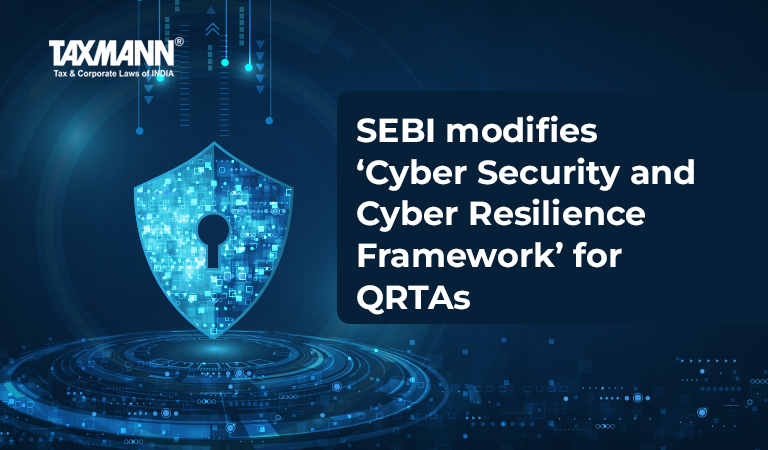SEBI modifies ‘Cyber Security and Cyber Resilience Framework’ for QRTAs
- Blog|News|Company Law|
- < 1 minute
- By Taxmann
- |
- Last Updated on 30 May, 2022

Circular- SEBI/HO/MIRSD/MIRSD_RTAMB/P/CIR/2022/73 dated May 27, 2022
The SEBI vide Circular SEBI/HO/MIRSD/CIR/P/2017/100 dated 08.09.2017 prescribed framework for Cyber Security and Cyber Resilience for Qualified Registrars to an Issue and Share Transfer Agents (QRTAs).
The SEBI has modified the framework prescribed for Cyber Security and Cyber Resilience for Qualified Registrars to an Issue and Share Transfer Agents (QRATs). As per the modified framework, more detailed norms are provided for the classification/designation of the critical assets.
The critical assets should include business-critical systems, internet-facing applications /systems, systems that contain sensitive data, sensitive personal data, sensitive financial data, Personally Identifiable Information (PII) data, etc. In addition to this, all the ancillary systems used for accessing/communicating with critical systems either for operations or maintenance should also be classified as critical system. The Board of the QRTAs is required to approve the list of critical systems.
Further, the report of the Vulnerability Assessment and Penetration Testing (VAPT) and the gaps found therein shall be submitted to the SEBI within a period of 1 month from the date of completion of VAPT activity.
The circular is made effective immediately.
Click Here To Read The Full Circular
Disclaimer: The content/information published on the website is only for general information of the user and shall not be construed as legal advice. While the Taxmann has exercised reasonable efforts to ensure the veracity of information/content published, Taxmann shall be under no liability in any manner whatsoever for incorrect information, if any.

Taxmann Publications has a dedicated in-house Research & Editorial Team. This team consists of a team of Chartered Accountants, Company Secretaries, and Lawyers. This team works under the guidance and supervision of editor-in-chief Mr Rakesh Bhargava.
The Research and Editorial Team is responsible for developing reliable and accurate content for the readers. The team follows the six-sigma approach to achieve the benchmark of zero error in its publications and research platforms. The team ensures that the following publication guidelines are thoroughly followed while developing the content:
- The statutory material is obtained only from the authorized and reliable sources
- All the latest developments in the judicial and legislative fields are covered
- Prepare the analytical write-ups on current, controversial, and important issues to help the readers to understand the concept and its implications
- Every content published by Taxmann is complete, accurate and lucid
- All evidence-based statements are supported with proper reference to Section, Circular No., Notification No. or citations
- The golden rules of grammar, style and consistency are thoroughly followed
- Font and size that’s easy to read and remain consistent across all imprint and digital publications are applied



 CA | CS | CMA
CA | CS | CMA
